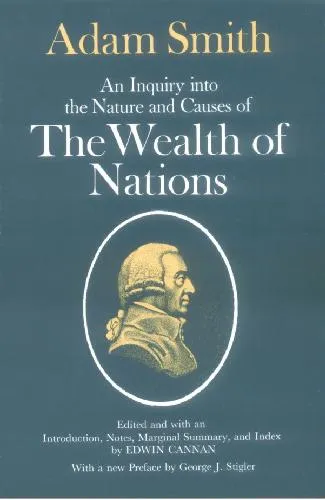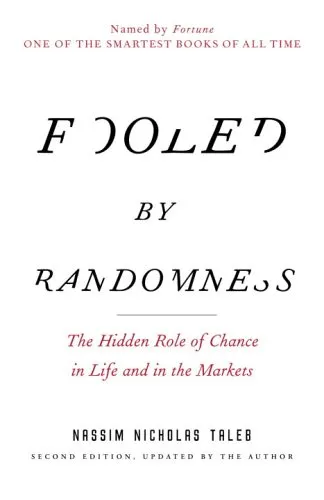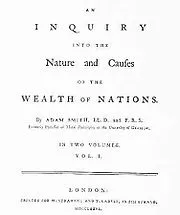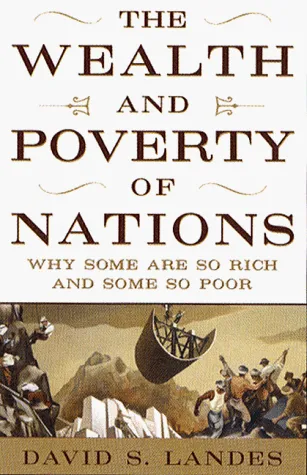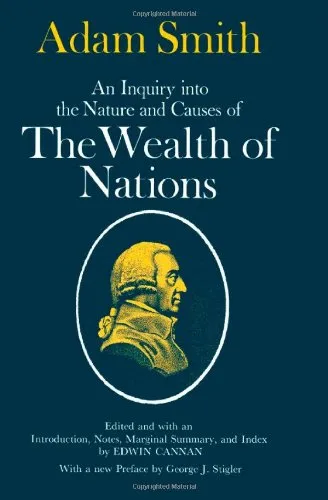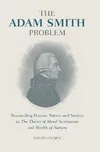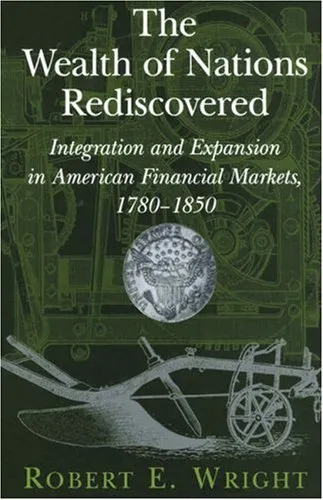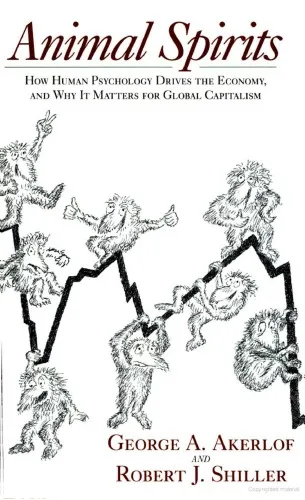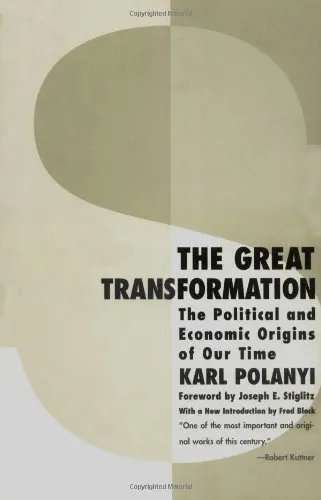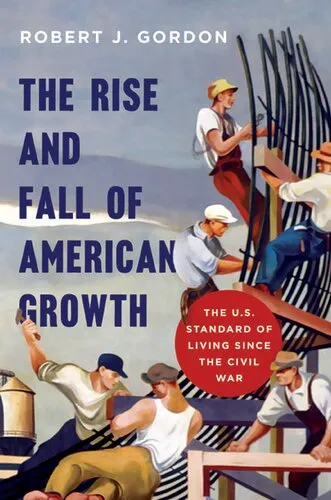The Wealth of Nations - An Inquiry Into the Nature and Causes of the Wealth of Nations
4.5
بر اساس نظر کاربران

شما میتونید سوالاتتون در باره کتاب رو از هوش مصنوعیش بعد از ورود بپرسید
هر دانلود یا پرسش از هوش مصنوعی 2 امتیاز لازم دارد، برای بدست آوردن امتیاز رایگان، به صفحه ی راهنمای امتیازات سر بزنید و یک سری کار ارزشمند انجام بدینکتاب های مرتبط:
معرفی کتاب "The Wealth of Nations - An Inquiry Into the Nature and Causes of the Wealth of Nations"
کتاب "The Wealth of Nations"، نوشته آدام اسمیت، یکی از مهمترین و تأثیرگذارترین آثار در زمینه اقتصاد و فلسفه اقتصادی است. این کتاب که در سال ۱۷۷۶ منتشر شد، به طور جامع به بررسی اصول بنیادین مربوط به اقتصاد، تقسیم کار، بازار آزاد و مفهوم آزادی اقتصادی میپردازد.
خلاصهای جامع از کتاب
کتاب "The Wealth of Nations" به پنج بخش تقسیم شده است که هر یک به بررسی جنبههای مختلفی از اقتصاد میپردازد. این کتاب با توضیحات دقیق در مورد طبیعت و علل ثروت ملل، بررسی تقسیم کار و نحوه تأثیر آن بر بهرهوری اقتصادی آغاز میشود. اسمیت توضیح میدهد که چگونه تقسیم کار میتواند هم به افزایش بهرهوری و هم به کاهش هزینههای تولید کمک کند.
سپس، اسمیت به مفهوم بازار آزاد و نقش دست نامرئی در تنظیم آن میپردازد. او تأکید میکند که بازارهای آزاد، اگرچه بدون دخالت دولت رها شوند، میتوانند به تخصیص بهینه منابع منجر شوند و رفاه عمومی را افزایش دهند. بخشهای دیگر شامل بحث دربارهٔ پول، قیمتها، توزیع درآمد و تحلیل سیاستهای مالی و مالیاتی است.
نکات کلیدی
- تقسیم کار میتواند به افزایش چشمگیر بهرهوری منجر شود.
- The invisible hand به تنظیم بازار و تخصیص بهینه منابع کمک میکند.
- بازار آزاد در مقابل محدودیتهای دولتی میتواند به توسعه اقتصادی پایدار منجر شود.
- نقش دولت در ایجاد چارچوب قانونی و حفظ امنیت اقتصادی ضروری است.
جملات معروف از کتاب
"هر فردی با دنبال کردن سود شخصی خود، اغلب به شکل ناخواسته به منافع عمومی خدمت میکند." - آدام اسمیت
"بهترین سرمایهگذاری، در ایجاد و تقویت مهارتها و دانش انسانهاست." - آدام اسمیت
چرا این کتاب مهم است
کتاب "The Wealth of Nations" به دلیل توضیح دقیق و تحلیل جامع اقتصاد بازار و اصول اقتصادی، تأثیر شگرفی بر تفکر اقتصادی و سیاستگذاریهای جهانی داشته است. این کتاب پایههای علم اقتصاد مدرن را بنا نهاد و همچنان یکی از منابع اصلی مطالعه در این زمینه محسوب میشود. اسمیت با استفاده از مثالهای واضح و تحلیلهای عمیق، تأثیرگذاری خود را نه تنها بر اقتصاددانان بلکه بر سیاستگذاران و کارآفرینان نیز نشان داده است.
تحلیلهای اسمیت در مورد تقسیم کار و The invisible hand تا به امروز نیز در مطالعه نظامهای اقتصادی و سیاستهای توسعهای مورد استفاده قرار میگیرد. این نکات نه تنها به بهبود اقتصادهای ملی کمک کردهاست، بلکه به عنوان راهنمایی برای ایجاد اقتصادهای پایدار و پویا تلقی میشوند.
Introduction
Originally published in 1776, "The Wealth of Nations" by Adam Smith is a seminal work that paved the way for the modern understanding of economics. As an inquiry into the nature and causes of the wealth of nations, the book delves deeply into the economic systems of Smith's time, offering timeless insights that continue to resonate in economic thought and policy today. This introduction sets the stage for exploring the book’s central themes, its groundbreaking ideas, and the reasons for its enduring relevance.
Summary of the Book
"The Wealth of Nations" is divided into five books, each addressing a distinct facet of economic theory and practice. Smith begins by exploring the concept of division of labor, arguing that specialization increases efficiency and productivity. He then moves on to discuss the nature of wealth, distinguishing between productive and unproductive labor.
In Book II, Smith addresses the accumulation of capital, positing that savings lead to investment opportunities which drive economic growth. Book III examines the evolution of economic structures, contrasting rural and urban economies and highlighting the role of agriculture and commerce.
Book IV presents Smith’s critique of mercantilism, an economic theory that emphasizes the role of government regulation and trade surpluses. Instead, Smith advocates for free trade and minimal restrictions, laying the groundwork for classical economics. Finally, in Book V, he discusses the role of government, arguing for a limited but essential intervention in providing public goods such as education and infrastructure.
Key Takeaways
- Division of Labor: Smith elaborates on the efficiency gained from specialization, which boosts productivity and innovation.
- Invisible Hand: The idea that individuals pursuing their own interests inadvertently contribute to the overall economic good, leading to efficient resource allocation.
- Free Markets: Advocacy for minimal government intervention and the benefits of international trade.
- Capital Accumulation: Investment is key to economic growth, necessitating savings and prudent financial practices.
- Role of Government: While supporting free markets, Smith acknowledges the state’s role in providing essential services and infrastructure.
Famous Quotes
"It is not from the benevolence of the butcher, the brewer, or the baker that we expect our dinner, but from their regard to their own interest."
"By pursuing his own interest he frequently promotes that of the society more effectually than when he really intends to promote it."
"No society can surely be flourishing and happy, of which the far greater part of the members are poor and miserable."
Why This Book Matters
"The Wealth of Nations" is more than just an economic treatise; it is a cornerstone of modern economic thought, influencing generations of economists, policymakers, and thinkers. Smith’s pioneering analysis of market mechanisms laid the foundation for classical economics and informed the principles of capitalism that dominate global economies today.
By examining the dynamics of labor, trade, and self-interest, Smith provided a framework to understand how individuals and nations can thrive economically. His insights into the benefits of free market systems and the invisible hand concept have been instrumental in shaping economic policy and debate, making it an essential read for anyone interested in economics, history, or political science.
دانلود رایگان مستقیم
شما میتونید سوالاتتون در باره کتاب رو از هوش مصنوعیش بعد از ورود بپرسید
دسترسی به کتابها از طریق پلتفرمهای قانونی و کتابخانههای عمومی نه تنها از حقوق نویسندگان و ناشران حمایت میکند، بلکه به پایداری فرهنگ کتابخوانی نیز کمک میرساند. پیش از دانلود، لحظهای به بررسی این گزینهها فکر کنید.
این کتاب رو در پلتفرم های دیگه ببینید
WorldCat به شما کمک میکنه تا کتاب ها رو در کتابخانه های سراسر دنیا پیدا کنید
امتیازها، نظرات تخصصی و صحبت ها درباره کتاب را در Goodreads ببینید
کتابهای کمیاب یا دست دوم را در AbeBooks پیدا کنید و بخرید
1659
بازدید4.5
امتیاز0
نظر98%
رضایتنظرات:
4.5
بر اساس 0 نظر کاربران
Questions & Answers
Ask questions about this book or help others by answering
No questions yet. Be the first to ask!
